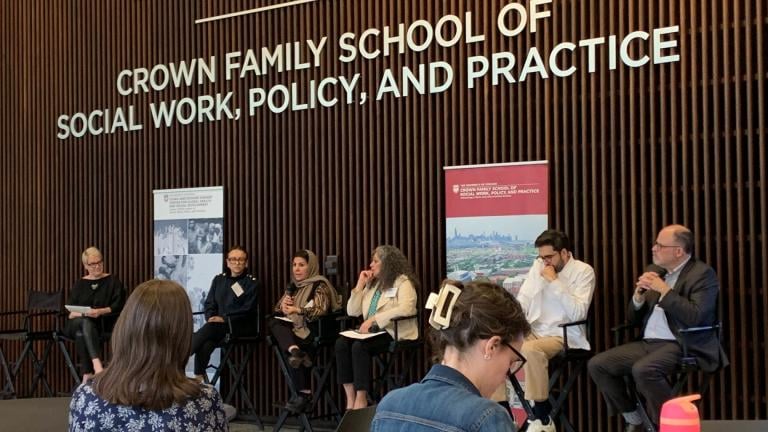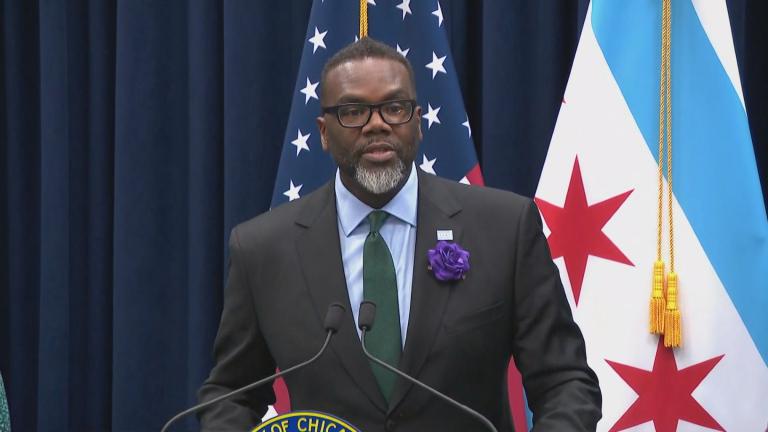Chicago officials evicted 15 migrants from city shelters through Wednesday, far fewer than expected less than a week ago, as Mayor Brandon Johnson resisted new calls to reverse course.
Since city officials began enforcing the 60-day limit on shelter stays imposed by Johnson, eight people were evicted on Sunday and Monday, with another seven evicted on Wednesday, according to city data. It was unclear whether anyone would be evicted Thursday.
The most recent evictions came on the same day that Ald. Andre Vasquez (40th Ward), the chair of the City Council’s Committee on Immigrant and Refugee Rights, renewed his call for the mayor to scrap the limit entirely and step up efforts to care for the men, women and children who made their way to Chicago from the southern border.
“The city should not be in the business of handing out evictions,” Vasquez said Wednesday morning. “No one in need of shelter, whether they are newly arrived or whether they were born and raised here, should ever face the fear and instability of being evicted from a city shelter knowing they have nowhere else to go.”
Johnson said the city had no choice but to evict migrants without additional substantial help from federal officials.
“The reality is that we have restraints,” Johnson said. “I’ve said from the very beginning that this mission is unsustainable. Local municipalities are not designed to deal with an international global crisis, particularly as it relates to migrants and asylum seekers.”
In all, more than 2,000 men and women sent to Chicago from the southern border will have to leave city shelters by the end of April, according to initial estimates released by city officials.
Migrants evicted from a city shelter with nowhere else to go can return to the designated “landing zone” for buses from Texas at Polk and Desplaines streets in the West Loop, and reapply for shelter, according to the policy. If space is available, the migrants could return for an additional 60 days, officials said.
It is unclear whether any of the migrants evicted from city shelters have reapplied for a new spot in a city shelter.
Officials announced March 15 that families with school-age children will be allowed to remain in city shelters until after the academic year ends in June.
In addition, no one will be evicted from the city’s migrant shelter in Pilsen, where 14 cases of measles had been confirmed through Thursday.
Everyone asked by health officials to quarantine for at least 21 days in that shelter after being exposed to measles will be allowed to stay for that period and an additional week, said Cristina Pacione-Zayas, Johnson’s first deputy chief of staff.
Three confirmed case of measles were discovered in residents of the Pilsen shelter between Monday and Thursday, city data shows.
Since the beginning of February, Chicago officials have closed five city-run shelters as the number of migrants arriving in Chicago slowed and the pace of people finding permanent housing increased.
Nearly 37,500 migrants, all of whom are in the country legally after requesting asylum, have made their way to Chicago as part of an effort by Texas Gov. Greg Abbott, a Republican, to damage President Joe Biden’s chances for reelection and divide Democratic voters.
Fewer than 10,800 people were living in 23 city facilities as of Thursday, a 10% drop since March 1, according to city data.
It is unclear whether city officials will close shelters as migrants are evicted, which would limit the number of beds available for those who have already been in a city-run shelter for 60 days as well as for new arrivals.
Contact Heather Cherone: @HeatherCherone | (773) 569-1863 | [email protected]








